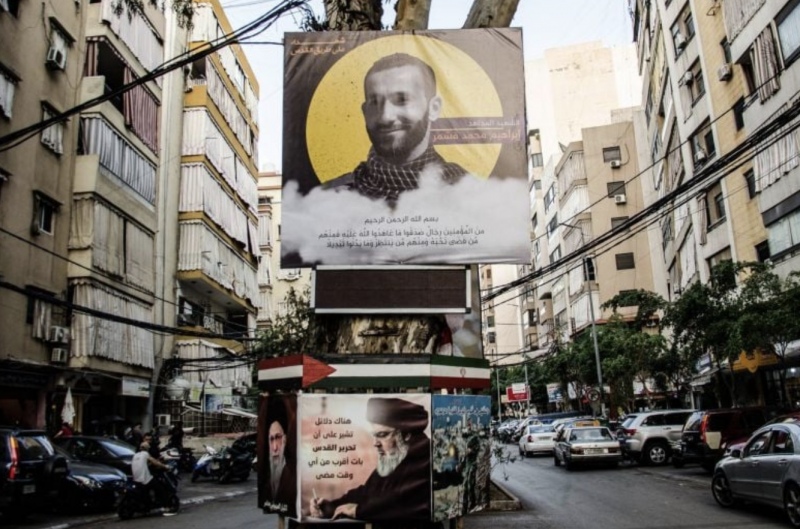
The portrait of a Hezbollah "martyr," Ibrahim Kashmar, above that of the party's leader, Hassan Nasrallah, on al-Shoura street, in the southern suburbs of Beirut, on Nov. 2, 2023. (Credit: Emmanuel Haddad)
In times of escalating tension between Israel and Hezbollah, marked by Israel's increasingly deep strikes extending beyond the border strip, it's crucial to recognize that warfare extends far beyond the realm of guns and artillery.
Both sides are actively engaged in intelligence operations.
Today, Lebanon appears to serve as a hotspot for intelligence agencies, reminiscent of the heightened activity witnessed during the 1970s and 1980s. Reports suggest a myriad of agencies are operating within the region, gathering sensitive information and possibly plotting operations. Some may even be leveraging individuals with diplomatic passports to facilitate their activities.
This complex landscape underscores the multifaceted nature of modern warfare, characterized by intricate battles, numerous ramifications and technical intricacies.
Against this backdrop, two recent incidents stand out.
The first incident unfolded in the southern suburbs of Beirut, where a group of Dutch nationals was apprehended, only to be subsequently released.
These foreigners with diplomatic passports were discovered in Haret Hreik, a Hezbollah stronghold, equipped with sophisticated military gear, resembling a commando or specialized unit preparing for an operation, according to a security source who spoke on condition of anonymity due to the sensitivity of the issue.
Reports indicate that Hezbollah detained the group initially but later relinquished them to army intelligence following significant pressure.
While suspicions of espionage loom over these individuals, an alternative narrative suggests they were formulating an evacuation strategy for their country's citizens in the event of a full-scale conflict between Hezbollah and Israel.
However, this account is faced with skepticism among residents of Haret Hreik.
The second noteworthy incident unfolded a few days later in the southern suburbs, involving the arrest of a Spanish national. According to a well-informed source, this individual, who possessed a diplomatic passport, was apprehended while photographing various locations in Beirut’s southern suburb, including the site where Hamas' second-in-command, Saleh al-Arouri, was assassinated.
Hezbollah handed over the individual to Lebanese authorities, who attempted to question him. However, he invoked diplomatic immunity and refused to cooperate.
He claimed that he got lost in the southern suburbs and took photographs of the neighborhoods to assist a friend in locating him.
L’Orient-Le Jour’s sources indicate that the suspect was subsequently released following intensive interventions by the Spanish embassy in Lebanon. Despite attempts to reach out, the embassy declined to comment on the matter.
Is history repeating itself?
"Every day, we arrest Lebanese and foreign individuals suspected of involvement in security operations, whether in the southern suburbs or elsewhere," said a security official on condition of anonymity.
This situation is reminiscent of the era spanning from the 1970s until the conclusion of the Lebanese 1978-90 Civil War, which saw Israeli commando operations targeting cadres of the Palestine Liberation Organization (PLO).
For instance, in 1973 Tripoli, Palestinian cadre Said al-Sabeh was assassinated by a group of individuals carrying German passports, though evidence suggests their true nationality was Israeli.
Similarly, that same year in Beirut's Verdun district, three PLO leaders — Kamal Adwane, Kamal Nasser and Abou Youssef Najjar — fell victim to an Israeli commando operation. Notably, among the infiltrators was Ehud Barak, disguised as a veiled woman.
Barak would later ascend to the position of prime minister, leading the government that opted to withdraw Israeli troops from southern Lebanon in 2000.
Despite this, the Israeli government did not hesitate to eliminate Hassan Lakkis, a high-ranking Hezbollah military figure and a close confidant of its leader, Hassan Nasrallah. Lakkis was fatally shot in the head in 2013 in the southern suburbs of Beirut.
With Hezbollah now potentially more exposed, there's a palpable concern within the organization about the resurgence of such infiltration operations onto Lebanese soil.
This apprehension is exacerbated by reports suggesting that Wissam Tawil, a prominent member of the party elite force al-Radwan Force, was assassinated in January via a car bomb detonated under his vehicle — not by an Israeli missile or drone, as initially declared.
Israel resorts to these methods due to limitations in relying solely on remote surveillance or drones, as indicated by a security source.
In recent weeks, one tactic employed by Israel involved reaching out directly to Lebanese individuals using foreign numbers, frequently from European countries, under the guise of offering job opportunities.
This security warfare extends to the realm of mobile phones. "The smartphone is a surveillance tool,” said Nasrallah in a speech in February. “It captures everything — from your conversations and messages to your location and photographs. It effectively becomes a gateway into your life and home.”
Nasrallah also warned against the use of surveillance cameras within homes, citing the Israelis' adeptness at hacking into such systems.
Another dimension of this conflict involves the deliberate disclosure of the names of Hezbollah leaders and operatives, effectively signaling that they are targets of Israeli action. This triggers a surge of inquiries seeking updates on their status.
Subsequently, exploiting this influx of communication, Israeli operatives can clandestinely monitor the network, pinpoint the whereabouts of the targeted individuals and execute their operations.
This sophisticated approach represents a distinct form of warfare, eschewing overt aggression in favor of covert manipulation, yet proving to be profoundly impactful.
This article was originally published in L'Orient-Le Jour. Translated by Sahar Ghoussoub.